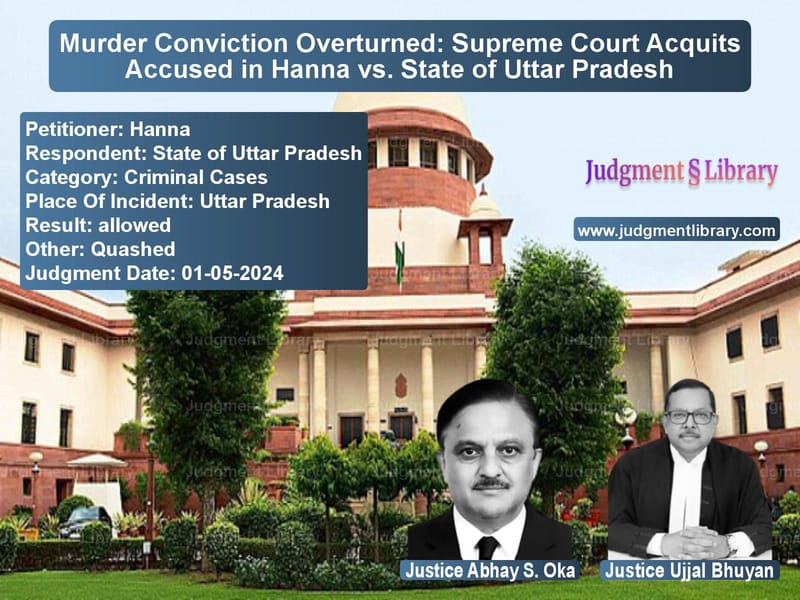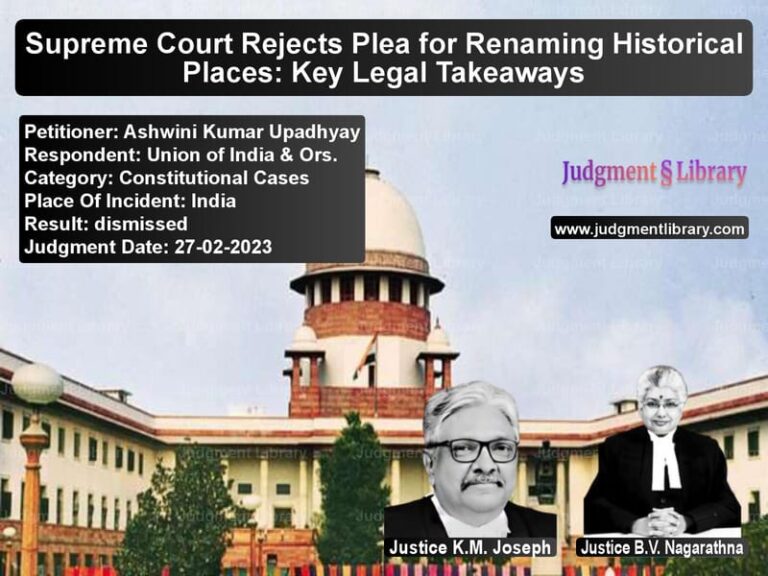Murder Conviction Overturned: Supreme Court Acquits Accused in Hanna vs. State of Uttar Pradesh
The case of Hanna vs. The State of Uttar Pradesh is a landmark criminal appeal in which the Supreme Court of India overturned the conviction of the accused under Sections 302 and 323, read with Sections 149, 147, and 148 of the Indian Penal Code (IPC). The case involved serious allegations of murder and assault, but the Court ultimately found that the prosecution failed to establish guilt beyond a reasonable doubt.
The judgment sheds light on critical aspects of criminal law, including the reliability of witness testimony, procedural lapses in the investigation, and the role of police coercion in securing false evidence. The Supreme Court emphasized that convictions must be based on legally admissible and credible evidence rather than coerced testimonies.
Background of the Case
The case originates from an incident that took place on 5th October 1995. The prosecution alleged that the appellants, armed with different weapons, fatally assaulted Pappu @ Har Narayan. The primary witness, PW-1 (Nanhi Bahu, the mother of the deceased), initially did not support the prosecution’s version of events but later changed her testimony after being recalled to the stand. Another key witness, PW-3 (Santosh, the deceased’s brother), also testified about the assault but his testimony was riddled with inconsistencies.
Read also: https://judgmentlibrary.com/supreme-court-acquits-man-in-1988-odisha-murder-case-after-36-years/
The appellants were convicted by the Trial Court and sentenced to life imprisonment under Section 302 IPC, with additional sentences for other offenses, all of which were to run concurrently. The High Court upheld the conviction, leading to this appeal before the Supreme Court.
Legal Proceedings and Key Issues
Trial Court Proceedings
- The prosecution’s case relied heavily on the testimonies of PW-1 and PW-3.
- PW-1 initially did not support the prosecution but later changed her statement after being recalled nearly 1.5 years later.
- PW-3’s testimony contained significant contradictions regarding his location at the time of the incident and the alleged motive for the crime.
- The Trial Court convicted the accused based on these testimonies and circumstantial evidence.
High Court’s Findings
- The High Court upheld the conviction, reasoning that the testimony of PW-1, after recall, was credible.
- It dismissed the contradictions in PW-3’s testimony as minor inconsistencies.
- The accused were denied relief, leading to the appeal before the Supreme Court.
Key Arguments
Arguments by the Appellants
The defense, representing the accused, raised the following arguments:
- PW-1, the mother of the deceased, had initially not supported the prosecution and was declared hostile. She later changed her testimony under police pressure.
- PW-3’s testimony was inconsistent and unreliable, with contradictions regarding his location and failure to report a motive to the police.
- The prosecution failed to establish a clear motive for the alleged murder.
- The police coerced witnesses to provide false testimony, as evident from PW-1’s admission that she was forced to change her statement.
- The prosecution withheld key witnesses, such as the widow of the deceased, who claimed to be an eyewitness but was never examined.
Arguments by the State
The State, representing the prosecution, countered with the following points:
- PW-1 was a grieving mother who initially withheld the truth due to fear but later testified truthfully.
- The minor contradictions in PW-3’s statement did not undermine the overall prosecution case.
- The brutality of the crime warranted severe punishment.
Supreme Court’s Judgment
The Supreme Court overturned the conviction, ruling that the prosecution failed to prove the case beyond a reasonable doubt. The Court made several key observations:
“It is very difficult to accept the prosecution case that PW-1 was threatened by the accused, and therefore, she did not support the prosecution on 2nd May 1997 when her evidence was recorded. The only conclusion which can be drawn is that after recall, she was compelled by the police to depose in a particular manner.”
Read also: https://judgmentlibrary.com/supreme-court-partially-restores-dowry-harassment-case-in-jharkhand/
The Court highlighted the following reasons for acquitting the accused:
- PW-1’s Changing Testimony: Her initial statement did not support the prosecution. Her later statement, made after police intervention, was unreliable.
- PW-3’s Inconsistent Testimony: His statements contained material contradictions regarding his presence at the crime scene and the alleged motive.
- Failure to Establish Motive: The prosecution’s case regarding a financial dispute lacked credibility.
- Non-Examination of Key Witness: The widow of the deceased, who claimed to be an eyewitness, was never examined.
- Police Coercion: The Supreme Court condemned the role of the police in influencing witness testimony, stating that such conduct undermines the credibility of the criminal justice system.
Legal Principles Established
- Witness Credibility: A testimony that changes under police influence cannot be the basis for a conviction.
- Beyond Reasonable Doubt: The prosecution must prove guilt conclusively, without contradictions.
- Protection Against Police Coercion: Courts must ensure that witness testimonies are free from undue influence.
Conclusion
The Supreme Court’s judgment in Hanna vs. The State of Uttar Pradesh reinforces fundamental principles of criminal law, particularly the importance of credible evidence and protection against police coercion. The ruling highlights the dangers of relying on coerced testimonies and underscores the judiciary’s duty to ensure fair trials.
By setting aside the conviction, the Court has reaffirmed the principle that no individual should be convicted based on unreliable evidence. This judgment serves as a reminder of the need for rigorous adherence to due process and evidentiary standards in criminal trials.
Petitioner Name: Hanna.Respondent Name: State of Uttar Pradesh.Judgment By: Justice Abhay S. Oka, Justice Ujjal Bhuyan.Place Of Incident: Uttar Pradesh.Judgment Date: 01-05-2024.
Don’t miss out on the full details! Download the complete judgment in PDF format below and gain valuable insights instantly!
Download Judgment: hanna-vs-state-of-uttar-prade-supreme-court-of-india-judgment-dated-01-05-2024.pdf
Directly Download Judgment: Directly download this Judgment
See all petitions in Murder Cases
See all petitions in Judgment by Abhay S. Oka
See all petitions in Judgment by Ujjal Bhuyan
See all petitions in allowed
See all petitions in Quashed
See all petitions in supreme court of India judgments May 2024
See all petitions in 2024 judgments
See all posts in Criminal Cases Category
See all allowed petitions in Criminal Cases Category
See all Dismissed petitions in Criminal Cases Category
See all partially allowed petitions in Criminal Cases Category







